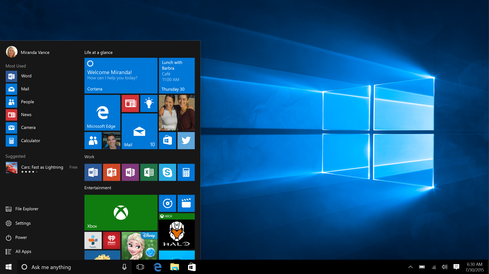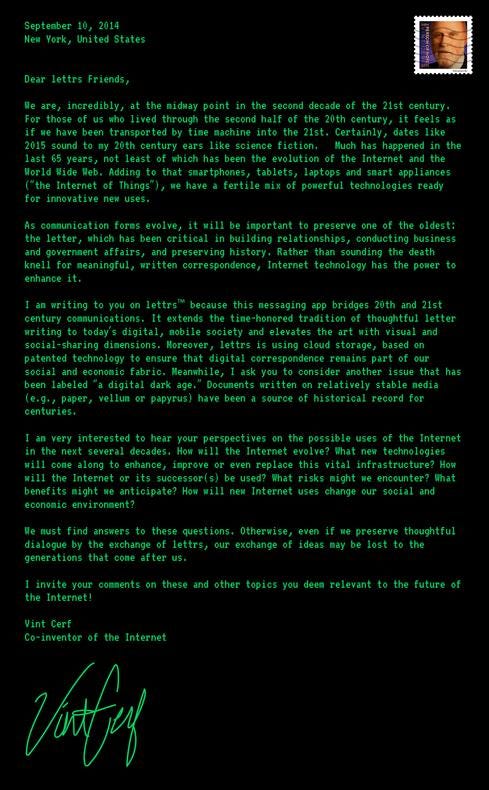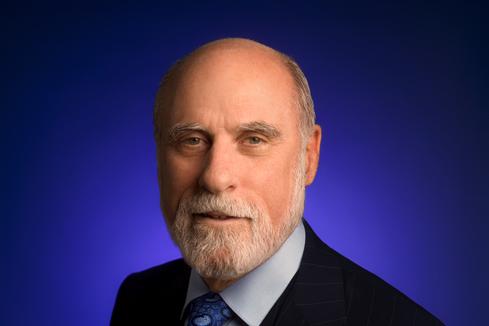Vint Cerf Wants Your Help Re-Imagining The InternetVint Cerf Wants Your Help Re-Imagining The Internet
Vint Cerf, recognized as one of the fathers of the Internet, is using social media to generate new ideas about how the Web should evolve.


Will Windows 10 Make It To 20? IT Watchers Discuss
Will Windows 10 Make It To 20? IT Watchers Discuss (Click image for larger view and slideshow.)
Vint Cerf, one of the creators of the Internet, wants your help in re-thinking it for the next generation.
Cerf is starting a public project to solicit ideas on how to evolve the Internet in general, and specifically how to shape it to improve education and address the looming Digital Dark Age.
Given his pedigree, Cerf's project is curiously 19th century. He wants you to write a letter. And he's done so himself, on the mobile messaging network lettrs.
Why a letter? Cerf said in an interview with information: "One of the things that has become very apparent to me is that letters in the past, because of the time delay for a letters to get back and forth, caused people to think fairly deeply about what they want to say. And they would couch their arguments to be understood even if [the recipient] wasn't there to ask questions."
He added, "Our modern communications tend to be very brief and rapid and don't involve thinking because we have another 100 emails to get through. The result is a lot of short, terse, not substantive communications."
[ Does anybody really know what time it is? Read NTP's Fate Hinges On Father Time. ]
Cerf has written an open letter (pictured below) in the hopes that people will respond in kind, with a long, thoughtful communication. He then hopes to take the best responses and feature them at Silicon Valley Comic Con, which is the brainchild of Steve Wozniak and Stan Lee and takes place March 18-20, 2016. Cerf will also share the results online, of course.
Figure 1: 
(Image: Vint Cerf)
What are Cerf's biggest concerns? He has plenty, but the Digital Dark Age might be his biggest worry. If that phrase is new to you, pay attention here. What Cerf is referring to could well be the biggest problem facing IT in the next decade or two. The Digital Dark Age refers to the idea that much of our most basic communication (not to mention our important records) may not be available to historians (or even ourselves) in the future, because we will no longer have the ability to access the digital media on which it is saved.
Lost History
Cerf cites Doris Kearns Goodwin's book Team of Rivals: The Political Genius of Abraham Lincoln as a perfect example of what might not be possible for historians of the next generation. Goodwin pieced together letters written by President Lincoln and his cabinet to write a book about how they interacted.
"In the case of Doris Kearns Goodwin, the letters were 140 years old, and I would guess that digital content that was created 10 years ago won't be accessible 10 years from now," said Cerf. "We have the media around, but you may not be able to read it."
Cerf had a much more mundane yet important example. He said he found a CD marked "Cerf Photo Archive 1." He couldn't remember what was on it or what device he had used to make it. He put it in several machines, all of which conveyed the message that the disc was blank. He knew he wouldn't have labelled a blank disk, and finally he found a machine that could read the disk. What would have happened had he waited a little longer to try to find the device to read the disk? Would the photos have been lost forever?
Imagine that scenario for all of our photos, all over the world. And all our videos. And all the records at all the corporations. And even the US government's National Archives. And ... well, you get the picture.
"The National Archives gets tons of information at the end of each administration, and it is getting harder and harder to preserve that because they have to deal with what software it was on, what created it, what it was created on, etc."
We're a generation creating more data and more records of our existence than any other, and yet we may save very little of it in the end. Cerf pointed to projects like Carnegie Mellon's Olive as part of the solution. Olive is working on ways to use old software to make archives more accessible and easy to run.
Even that solution may get complicated. According to Cerf, we need to sort out issues around intellectual property for software no longer in regular use but crucial to preserving data. Cerf also thinks we need to
(Continued on page 2)
(Continued from preceding page)
rethink the business model around archiving and likens it to early libraries. "We saw libraries in the United States emerge initially from private sector support from people like Andrew Carnegie," said Cerf. "Eventually it became so important that the public could get the information that they needed [that] we saw the creation of public libraries. No one business model can solve this problem alone."
Cerf added: "I don't want to rely solely on accidental preservation. I would like to have, at my beck and call, technology that will allow me and others to save their own data and access it without worrying about what it was created on."
[ What does tech pioneer Cees Links think about the Internet of Things? Read Wifi Pioneer Cees Links: IoT Is Like a Butler. ]
While there's much work to be done in order to preserve the past, Cerf said he sees great potential in how the Internet can shape the future, particularly as a tool for changing and improving the 21st century classroom.
"Historically, we think of classrooms as oriented around desks and chairs [facing] toward the teacher at the center of the room," Cerf said, "It is a broadcast format. The teacher teaches and students take notes. I think another model might be more interesting. Maybe students are talking to each other instead of listening to a teacher, or they have access to remote instruments, or [are] talking to other classrooms, or maybe they are at home. Classrooms aren't very distinct. The idea that you really don' t have to be in the classroom to learn is very interesting."
Cerf is especially interested in the Massive Open Online Course (MOOC) model. "Not only do you have a multiplier effect of how many people can be in the classroom," Cerf said, "but there are also ways to personalize education, followed by remedial help if you need it."
The model is challenging to implement, according to Cerf, "because you have to guess what students won't understand and plan accordingly." In some ways, the concept of MOOCs is not far removed from Cerf's views about letter-writing. He agreed that in both cases there's the opportunity to make discussions more thoughtful. In fact, he said he's hoping that his letter-writing efforts will spark a redesign of the 21st century classroom.
Internet Inflection Point
Is the Internet he helped create disappointing him? Cerf said he doesn't think the Internet is broken. Rather, we're at an inflection point where we need to think about how we want it to evolve. He stressed that the Internet is only an infrastructure. How you choose to use it makes all the difference, and, he said, "I'd like to think the constructive uses outweigh the non-constructive uses."
Cerf does sound an important warning about the Internet, and Google searches in particular. "When you get an answer [via an online search] you have to decide if you believe the answer," he said. "This is called critical thinking. Where did the information come from, and do we trust it? And so there is more burden on us."
Figure 2: 
(Image: Vint Cerf)
Still, he said his only disappointment is that there are 3 billion people online, "and 4 billion people to go."
If we find a way to get those other 4 billion people on the Internet, maybe they can help us evolve it and address Cerf's other questions.
In the meantime, Cerf's letter sits as a challenge and an invitation to all who are interested in the Internet. How do we make it better? What should it be used for? How can we bring deeper exchanges of information back to the Internet?
These are interesting questions to ponder in an era in which Internet content is judged by how quickly it goes viral. "The fact that 9 million people look at something isn't about exchange," Cerf said, "This letter invites people who want to be involved to express their thoughts. On the Internet, if you get comments, they are usually rather brief, and they lead to a crazy debate on beliefs. I hope this creates a more thoughtful exchange."
If a more thoughtful exchange is something that interests you, check out Cerf's letter and help him evolve the Internet.
About the Author
You May Also Like






